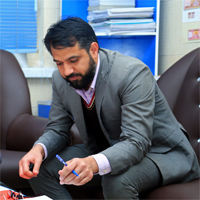KABUL CITY – Everyday, Rasouli processes employee salaries and handles pension-related documents at the central bank. The work is neither complex nor difficult for Rasouli after working at Da Afghanistan Bank (DAB).
Rasouli, however, has not been able to move on in her career or apply for better positions because of her lack of qualification. She has a two-year diploma in management and had been unable to go further in university because she could not afford it. “I was always looking for an opportunity to get my BBA [Bachelor of Business Administration] one day,” she says.
The opportunity came when she was selected by DAB to pursue a BBA course at University under the Financial Sector Rapid Response Project (FSRRP). “,” says Rasouli happily.
Rasouli is one of some 700 DAB employees who have been given the opportunity to study for a bachelor’s or master’s degree at university or pursue professional and technical courses under the DAB Talent Development Program started by FSRRP in February 2018. These employees will pursue professional courses related to their work, such as Certified Internal Audit, Certified Anti Money Laundering Specialist, Association of Chartered Certified Accountants, and Certified Expert in Financial Inclusion Policy.
FSRRP is implemented by DAB, with funding support from the International Development Association (IDA), the World Bank Group’s fund for the poorest countries. .

